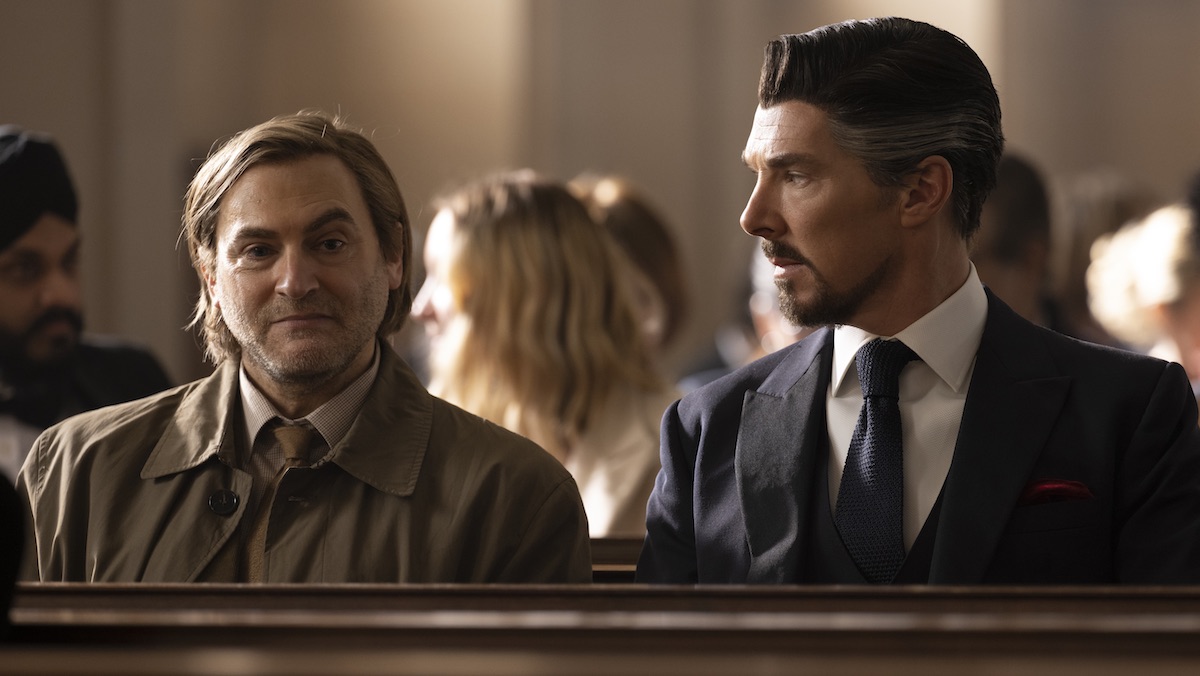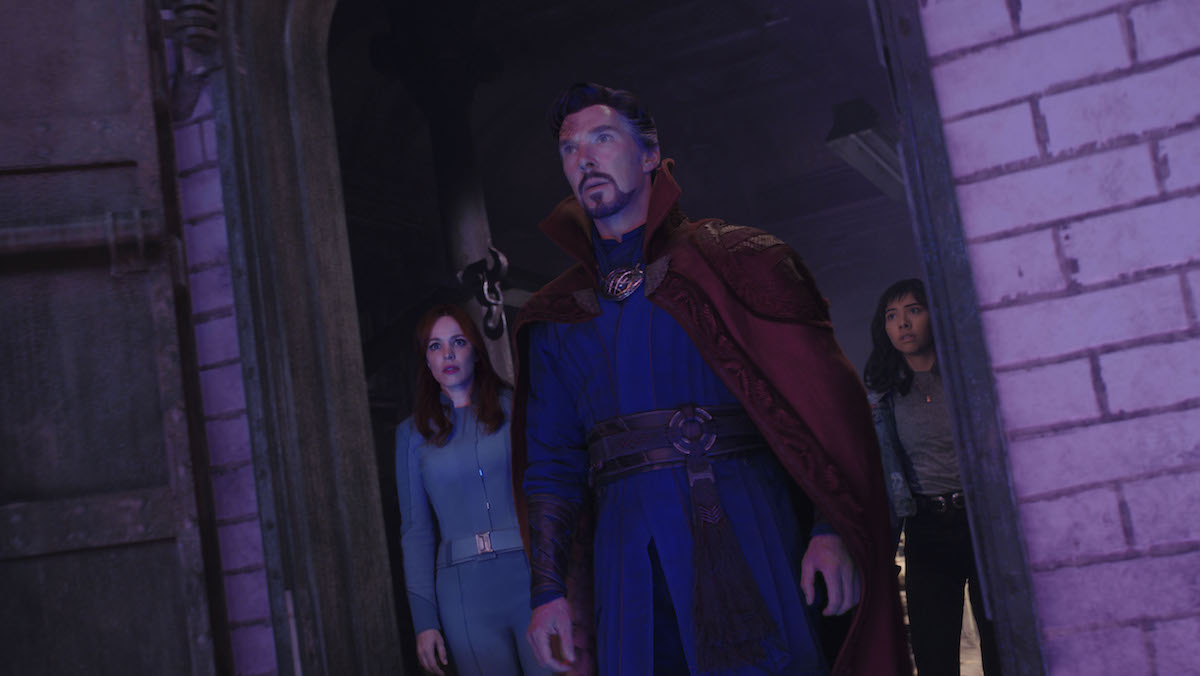Doctor Strange in the Multiverse of MadnessOpens in a new tab‘ infinite universe meant infinite possibilitiesOpens in a new tab. Not only for the film’s plot but for every characterOpens in a new tab, even the ones who ultimately didn’t appear. So how did Doctor Strange 2 end up deciding on who made the cut and what they’d do in the film? That’s what we wanted to know when Nerdist got a chance to speak with screenwriter Michael WaldronOpens in a new tab. He told us about how he brought the Illuminati to the MCU, the members he wish had been in the group, how Wanda’s role developed, and the many things we almost saw in Doctor Strange 2.

Nerdist: MCU movies are obviously collaborative efforts, but what elements of Doctor Strange in the Multiverse of Madness are you responsible for that make you proud?
Michael Waldron: I went off script from the outline and put the Illuminati in there. That was a surprise to everyone in my first draft. Nobody knew that was going to be in there. What happens to them was also a surprise.
I knew we had Sam [Raimi] and I knew it would be great if we did it that way. It was my idea, but really it was only possible because I was able to trust our filmmaker so much.

What was your process for determining the Illuminati lineup?
Without getting into specifics of that lineup, it was always kind of a moving target as to who was going to be in the group. And honestly, the final Illuminati lineupOpens in a new tab represents even beyond my wildest dreams. Even beyond that first draft’s, “Well, here’s the wildest possible group of people that I know we couldn’t actually get.” The fact that we got the people we got, and did to them what we did, I’m still like, “That’s crazy. That’s insane that we pulled that off.”
So it was different versions of just finding the right alchemy for this team, trying to really think about, “What would be a smart version of the Illuminati to put together in this universe?” Looking at the Illuminati that’s actually in the comicsOpens in a new tab, thinking about who fulfills those roles and, and going from there. Who would be the most exciting cast of characters for people to see?

If you could have added any additional member—character and actor—who would you have put in there?
Look, Tom Cruise as Iron Man would’ve been cool. As everybody was saying that I was like, “Yeah, of course!” I remember reading those rumors on Coming AttractionsOpens in a new tab back in the day.
Was he in your original lineup?
No, he was not.
Is there anybody you can tell us who was, but didn’t make the cut?
I wrote a near and dear character to my heart, Phone Ranger, who’s just a ridiculous phone-based superheroOpens in a new tab. [Waldron laughs] He met a grizzly end in the original draft of my script, but he didn’t make it in.

Once you knew you had certain actors to play certain roles, did that change your script and how you wrote for them?
Yeah, of course. Once you know you have that cast you want to write to their strengths. With each one of these characters it became a real collaboration between myself, them, and Sam, because they were only going to have a short amount of time to hopefully make a big impact on the movie. So we worked to make sure we were rendering these versions of themselves effectively in that short amount of time.

Aside from the Illuminati, what’s something that didn’t make it into the movie you really wish had?
In my first draft, Wanda rewrote Wong into an ‘80s action hero. She made Wong basically into her henchman and rewrote him into an Arnold Schwarzenegger in the eighties Commando/Predator-style action hero and sent him after Strange. That assault on the Illuminati headquarters was Wanda, but then it was Wong with, like, a grenade launcher. These are the things that make their way into the first round. That was pretty good.

Michael Stuhlbarg has only one scene, but it’s a very powerful and emotional oneOpens in a new tab. Why did you think that was an important moment to include in the movie?
Well he’s tremendous. I was like, “We have to put him in if nothing else because I want to write dialogue for him.” He’s just so good. I was so, so honored. And he felt, as a guy who knew Strange in Strange’s former life as a surgeon, like a character who could effectively hold up a mirror to Strange.
There were versions [of the story] and discussions of him showing up in the other universes as well. There’s a comics history, in The Oath by Brian K. VaughanOpens in a new tab, where the character Nic West becomes an evil sorcerer and adversary of Strange. So I wanted to keep him alive in the [MCU] because Stuhlbarg’s so great.

How long into the process were you when Wanda was not only the villain, but the villain immediately? Was that something that was always there? Or did the developmental process move that up to an earlier point the film?
No, that was not always there. Initially it was more of an ensemble piece and she wasn’t the driving antagonistic force. But when COVID happened, and Sam and I had the chance to say, “Alright, if, if we wanted to start from scratch on this thing, what would we want it to be?” The first big decision we made was, “What if this was the story about Strange having to protect America as Wanda pursues her across the multiverse?” That became the first choice I had to make in writing what ultimately became the script.

Strange’s story is one about not being happy, but accepting that’s the role he’s taking on in life. How did that idea develop from the beginning of your process to what we saw in the film?
I always thought it was an interesting idea. And I talked Benedict [Cumberbatch] a lot, and we found it interesting that Strange was never going to take some seismic leap. The character had already grown. He grew a lot in the first movie. This is really a story about him becoming more aware of his flaws and who he is. And maybe why he is that way, being able to admit that he’s scared of connection. Whereas at the beginning he perhaps kind of lies to Christine and says he had to make sacrifices, that’s why they couldn’t be together. Finally, by the end is able to admit the truth.
I think it’s cool because for a guy that when we met him just wanted to be the best surgeon, wanted to make the most money, and, as Nick West says, becomes the best superhero, for him to finally get to a point where he realizes, “You know what, that doesn’t make you happy, but maybe it’s my friends. Maybe it’s the fact that I don’t have to go through this alone. That’s where I can find happiness,” that, that just felt interesting to me. And especially juxtaposed with Wanda, who’s going to devastating lengths in this movie to seize her idealized version of happiness.

For a movie about traveling through infinite possibilities it’s only fitting Doctor Strange in the Multiverse of Madness had so many possible versions. Based on MCU fans’ reactions, though, it looks like most of them are happy with the movie they got. Although we’ll always be a little jealous that in a parallel world ’80s action henchman Wong killed Phone Ranger.
Mikey Walsh is a staff writer at Nerdist. You can follow him on Twitter at @burgermikeOpens in a new tab. And also anywhere someone is ranking the Targaryen kings.